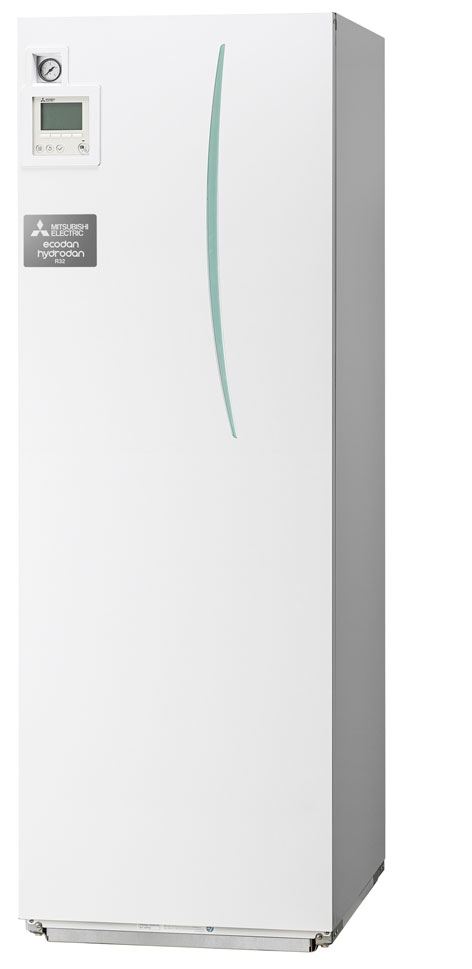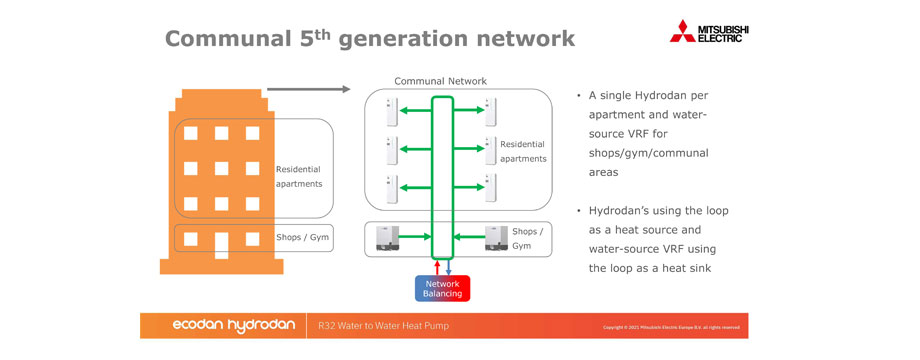Housing Association magazine’s Joe Bradbury discusses the importance of improving energy performance in Britain’s flats and apartment blocks.
On the 18th November 2020, Prime Minister Boris Johnson presented a broad ten-point strategy to help the UK become carbon NetZero by 2050. In a bid to make our homes, schools and hospitals greener, warmer, and more energy efficient, he set a goal of installing 600,000 heat pumps annually by 2028. This, he said, would create 50,000 jobs by 2030.
When the industry first heard this, we had all assumed that getting to 600k annually would entail the installation of individual air source heat pumps on individual properties. However, a recent innovation challenges this assumption completely, offering multiple ways of delivering sorely needed heat pumps to the Nation.
 Ecodan Hydrodan is a new, highly efficient water-to-water heat pump for the multi-residential market from Mitsubishi Electric.
Ecodan Hydrodan is a new, highly efficient water-to-water heat pump for the multi-residential market from Mitsubishi Electric.
The packaged 'plug and play' solution is specifically designed to deliver heating and hot water in residential units such as tower blocks, flats and apartments. “There are already renewable heating solutions for single homes, but this is one of the first truly low-carbon options available for multi-residential apartments”, said Alex Bagnell, Product Manager for Hydronics at Mitsubishi Electric.
“The next decade will see us continue to decarbonise home heating, in order to reach the net-zero target and low-carbon technology will play a pivotal role here. Ecodan Hydrodan, and particularly the use of water-to-water heating, is well placed to support this”.
It’s a matter of environmental urgency
Did you know that Britain's leaky houses pose a greater hazard to the environment than all of the country's cars combined? This is according to new research from the National Housing Federation (NHF), which represents housing associations in England.
The recent study predicted that England's 25 million houses, which release 58.5 million tonnes of CO2 each year, are equivalent to the annual use of 28 million cars. However, In England at present, there are only 27 million cars are in use, emitting 56 million tonnes of CO2 each year.
This is largely due to the unhealthy mixture of gas central heating and poor insulation. Heat quickly escapes out of homes, requiring even more gas to keep them warm.
In spite of this, over the last decade, the energy efficiency of English homes has actually improved – meaning we’re moving in the right direction. This is largely down to the efforts of the social and affordable housing sectors. Thanks to due diligence, social rented homes remain the most energy efficient in Britain today. Owner occupiers are more likely than renters to have a boiler system with radiators and gas central heating. Last year’s Energy Report from the government highlighted that 90% of English homes have a boiler system with radiators as their main heating system. Such systems are more prevalent in owner occupied dwellings (94%) than local authority (89%), private rented (83%) and housing association (83%) dwellings.
The role of social housing providers
Housing associations are in a unique position to innovate and deliver new, energy-efficient homes because of their financial position and charitable nature. This not only helps the government meet its net-zero carbon targets and has broader societal advantages, but it also directly benefits tenants by making their houses warmer and lowering their energy expenditures.
However, as a large number of the homes that will exist in 2050 have actually already been built, a significant financial investment will be required to either retrofit existing social housing. The alternative is daunting and far less environmentally friendly; demolishing and starting again. It’s therefore clear that environmental sustainability is not just a key strategic objective because of the societal benefits, but also because it is a costly financial liability that will only increase year-on-year if ignored.

Is retrofitting the answer?
Given the fact that one in five households live in flats (most commonly in blocks of three storeys or less), there are almost 5 million UK residents who could stand to benefit from the latest innovation in heat pump technology.
Improving the energy efficiency of these multi-residence properties is critical if we are to lower our energy use, tackle fuel poverty, and reduce CO2 emissions. However, due to the limitations of EPCs, technical issues, and the large number of stakeholders involved, retrofitting these buildings can sometimes prove to be extremely complex.
Ecodan Hydrodan is the answer. The units can be put in individual apartments to provide domestic hot water and low-temperature hot water for heating, with an integrated storage tank. To provide renewable heating and hot water, the units connect to a 5th generation ambient temperature heat network installed throughout the building.
This article and other blog’s by Joe Bradbury appear regularly on Mitsubishi Electric’s The Hub, visit https://les.mitsubishielectric.co.uk/the-hub
- Log in to post comments














